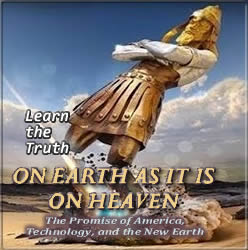To Donate or Not to Donate
That is the Question, Pt. 2 of 5
Everyone has heard the old adage: “You can’t take it with you.” Right? What’s more, all those who’ve heard it no doubt assume it comes straight from the pages of Holy Writ. Well, if not straight from it, then at least it’s there in spirit. I mean, Jesus Himself told us: “What good is it for someone to gain the whole world but lose their soul?”1 What else could this mean except that to get into Heaven we have to relinquish our present life and everything in it? Isn’t that the context of what Jesus said? He did preface His remarks about a person losing their soul with the statement: “For whoever wants to save their life will lose it, but whoever loses their life for My sake and the gospel will save it.”2 Doesn’t that prove that the earthly possessions we gain down here and the heavenly bliss we hope to gain over there are incompatible?
If by that you mean to say they’re incompatible because God views earthly possessions as being evil, then I’d say, “no,” on both counts. Because when it comes to determining the meaning of a given passage by way of its context, it doesn’t mean just looking at the context of a few sentences. It also means looking at that passage in the context of Scripture as a whole. And when we do that, we can’t help but see through the fallacy that God is somehow repulsed by earthly possessions. We’re not to avoid money or wealth but greed. Money or wealth don’t corrupt the human soul but the blind ambition that seeks to horde money and amass wealth.
Of course, in pointing this out, some might be saying, “Sure, I’m aware of all that, but I’m not so sure what any of it has to do with the latest misconception. Aren’t we supposed to be talking about the scripture that tells us: ‘You reap what you sow’?3 Isn’t that talking about how good things happen to those who do good, and how bad things happen to those who do bad? That’s how I’ve always been taught this verse to mean. Why are you carrying on about earthly possessions and greed?”
“Well, as a matter of fact,” I’d reply, “I’m talking about these things because when it comes to the real meaning of the verse that speaks of sowing and reaping, it turns out to be yet another case of mistaken identity. The only difference is, this time the confusion arises because of its association with other scriptures that speak of sowing and reaping in the way we’ve come to associate with this concept. What we’re dealing with, then, is actually a principle that’s correct but which, in this case, is being misapplied.”
To demonstrate this, let’s first look at those passages in The Bible that speak of sowing and reaping in the way we typically view it. After that, we’ll show how this misapplied context distorts the Apostle Paul’s intended meaning when he spoke of sowing and reaping to the Galatians.
Story Continues Below
Says Richard Price—the founder and CEO of Academia.edu—on his podcast In Depth With Academia:
Tales of Forever: The Unfolding Drama of God’s Hidden Hand in History is:
To hear Price’s book review of Tales of Forever, CLICK HERE.
To hear Kent talk about the little-known biblical prophecy, which speaks of the 5,500-year chronology from Adam to Christ, with Zen Garcia, the host of the Internet talk show Secrets Revealed, CLICK BELOW.
Story Continues From Above
According to Scripture, there’s no distinction between the operations of the natural world and the supernatural world, which is just another way of saying that the laws of the spirit and the flesh both act in accordance to God’s decree. As it is written:
For as the rain and the snow come down from the sky, and don’t return without watering the ground, making it bear and sprout, and furnishing seed for the farmer and bread for the hungry, it’s the same way with the word that proceeds from My mouth. It won’t return to Me empty without accomplishing what I’ve desired and without succeeding in the purpose for which I sent it.4
Scriptures such as this establish the way that God has ordained the processes undergirding all life, whether natural or supernatural, so much so that it would be difficult to demonstrate where one realm ends and the other begins. As such, it’s no mere poetic expression to say that God’s word is like the rain that waters the ground, and that it’s like the seed that produces bread for the hungry. His word is the rain; it is the ground; it is the seed; it is the bread. Little wonder that when it comes to our understanding of the inner workings of the Universe, most of us have no problem with seeing the link between the act of sowing with the consequence of reaping.
Sometimes this sowing has positive results, as when the psalmist said, “Those who sow with tears will reap with songs of joy.”5 Other times, it has negative results, as when the writer of Proverbs said, “Whoever sows injustice reaps calamity.”6 But whether for good or bad, the principle of sowing and reaping never fails to work itself out: “A wicked person earns deceptive wages, but the one who sows righteousness reaps a sure reward.”7
It’s precisely because of verses like these, then, that most people assume that Paul, in his letter to the Galatians, is also speaking along these same lines. Now, this doesn’t mean this principle of sowing and reaping bears no relationship to the verse in Galatians. It’s just that because this scripture is usually glossed over, I’m afraid the more specific meaning that Paul is trying to impart is itself being glossed over, and thus the “big picture” that’s waiting to be discovered and acted on is constantly being overlooked. And I might add, it’s not just important to the saints and to God, but it’s also important to the enemy of truth, Satan, who hopes to keep this big picture under wraps as long as possible.
Again, if I may be so bold as to remind the reader, whenever we see the devil this determined to keep a truth from the mainstream of conscious awareness, that’s our first clue that what’s being obscured is important to God. In fact, we’ve seen this so often throughout this list, it could be said to be just as crucial a principle as those three laws of disinformation. As such, we can actually rate how important something is to God by analyzing the extent to which Satan seeks to corrupt a genuine understanding of it.
How do we know there’s a message of God’s control over history revealed in the Zodiac? Just look at how the devil has sought to make this the exclusive domain of fortune tellers, in opposition to anyone who’d instead see the glory of God, which is Christ. How do we know we should pay attention to the historical facts of Jesus’ birth? Just look at how those events have become obscured by all the confusion Satan has generated regarding a multitude of other dying-and-rising heroes. How do we know the importance of a right understanding of raptures and false prophets, of Heaven and Hell, of theology and science, of the role of men and women, of slaves and masters? Again, just look at how much energy and effort the devil has exhausted in confounding each and every one of these issues.
So we can only imagine the joy it brings Satan when Christians the world over continually reduce what Paul really said concerning this otherwise sound doctrine of sowing and reaping. Rather than quote this verse with an understanding of its proper context—which we’ll convey momentarily—it’s reduced to a glib retort that’s become nothing less than a cure-all for every human tragedy. With each injustice perpetrated upon the innocents of this world, we fall back on the same pat answer, again and again: “They’ll get theirs, by God, because you reap what you sow!”
But unfortunately, although I agree with them, in principle, that evil people will one day face the judgment of God for their evil ways, I’m afraid the verse in Galatians just isn’t available for that purpose.
Now, in pointing this out, it doesn’t mean I’m ridiculing anyone for saying such things. After all, I’d be the first to admit that when it comes to discerning Paul’s true intent in this case, it’s a lot like trying to find a needle in a haystack. That’s because in looking at so many of the other misconceptions on our list, we’ve repeatedly seen that their effectiveness lies in their being read out of context. Oddly enough, though, as it turns out, the effectiveness of this latest misconception is due entirely to its being read in context!
Now, before anyone accuses me of contradicting myself, please bear in mind two important things. One, this is definitely an exception to the rule, and, two, don’t forget what I’ve repeatedly said about how we’re to respond to the apparent contradictions in The Bible that aren’t really contradictions at all but paradoxes.
So, when I say this misconception is so effective because it’s being read in context, what I mean is, when Paul talked about sowing and reaping in Galatians, he’d actually shifted gears so dramatically mid-thought that most are never even aware that he’s done so. And it’s this dramatic shift in thought that, I believe, is what causes most to assume that Paul is still thinking in terms of what he’d been talking about up to that point in his letter.
To demonstrate what I mean by this, let’s review the biblical context of Paul’s statement.






